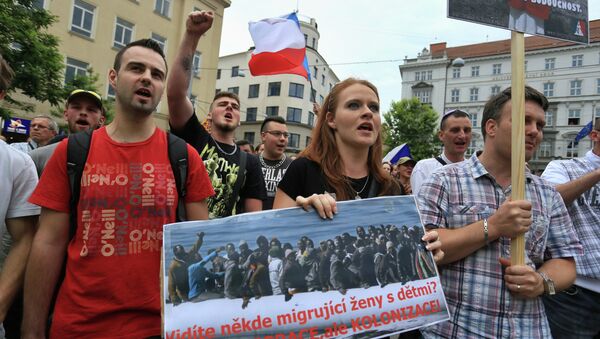Two-thirds of the students expressed negativity towards migration and only one-third supported the policy of multiculturalism. Sputnik discussed the survey with Mr. Koros.
Sputnik: How do you evaluate the results of the survey? Is the high percentage of students who are negative about migration surprising to you, considering that the problem of illegal migration in the Liberec region is not that acute?
READ MORE: Czech Lower House Supports Boosting Troops Numbers in Int'l Military Missions
Jan Koros: I assess the results realistically. It turned out as it turned out, we must respect any opinion. The high percentage [of those opposing migration] did not surprise me personally, because if you look at what is happening in Europe, the fear of migration will seem as quite a natural feeling to you, as well as the results of the survey. In the Liberec region, as in the whole of the Czech Republic, the problem with illegal migration is not so acute; it is clear that, for example, in Britain, France, and Belgium, everything is much more difficult if you look at what is happening there, the results [of the survey] will seem quite natural.
Sputnik: According to the data received, 48 percent of female students and 76 percent of male students have a negative attitude towards migration. Why do men and women perceive the problem of migration in different ways?
Jan Koros: I think that the difference [in the perception of migration] between male and female respondents is that women can feel the distress of other people more, they are empathic, and therefore the desire to help others is higher. While men tend to be more radical, which is confirmed by the results of the study.
Sputnik: The difference in perception was observed in different age groups: students aged 22 and under were "clearly against" in 15 percent of cases and "rather against" in 50 percent of cases, while in the 23 years and older group, these indicators were 21 percent and 41 percent, respectively.
Jan Koros: With age — it's very difficult. Two categories were singled out, and the "older" group reacted more positively to migration in the Czech Republic, but the difference was not so great, so I would not make any special conclusions from this. But, perhaps, the younger people in this sense are more radical.
Sputnik: If a similar survey was conducted at other universities, do you think the results would be the same? Do you think the attitude of Liberec students towards migration is typical for Czech youth?
Jan Koros: I think that we would get similar results in Ostrava, Zlín and South Bohemia region and also in a number of other universities. While on the contrary, students of Charles University in Prague, in my opinion, would have taken a completely different stance on the issue of migration. Those living in the capital have very different views from residents of other regions of the Czech Republic; they would rather speak in favor of migration, but this is my personal opinion.
The views and opinions expressed by the contributors do not necessarily reflect those of Sputnik.




